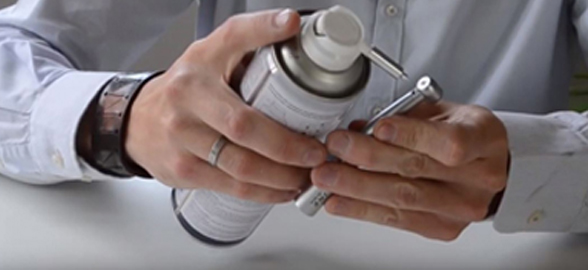Choosing the right binocular loupes is not as simple as it seems, often a lack of information means you wear lenses that can affect not only your eyesight or your comfort, but also your work.
Dental magnifying glasses act as if you were looking at infinity, the benefits of using them are highly guaranteed. There are different types, specialities and brands, here is a small guide to help you choose the right magnifying glasses and to inform you about the importance of their use in dental clinics.

Why use binocular loupes?
Ergonomics and posture:
More than 80% of dentists suffer from neck and back pain. Poor posture in the dental practice is the main cause of muscular ailments and strains. By using magnifying lenses, a greater inclination towards the patient can be avoided and the posture and therefore the pain suffered by the specialist can be reduced.
Reduction of ocular fatigue:
Dentists make a constant visual effort to be able to see the pathologies of patients in detail. The use of dental magnifying glasses allows the eye to relaxpermitting you to greatly improve your visibility.
Better visualisation of the patient's oral cavity:
By seeing the patient's oral cavity better, improved diagnosis and finishing touches are achieved, giving better results and increasing customer satisfaction in your practice.
More credibility and trust:
Increases the level of confidence of patients by giving a professional and more detailed image.
Types of dental magnifying glasses
There are different types of dental magnifying glasses, which vary according to their design, adaptability and grip:
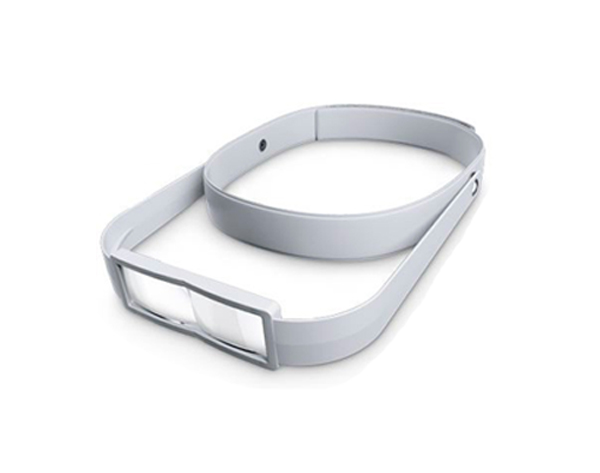
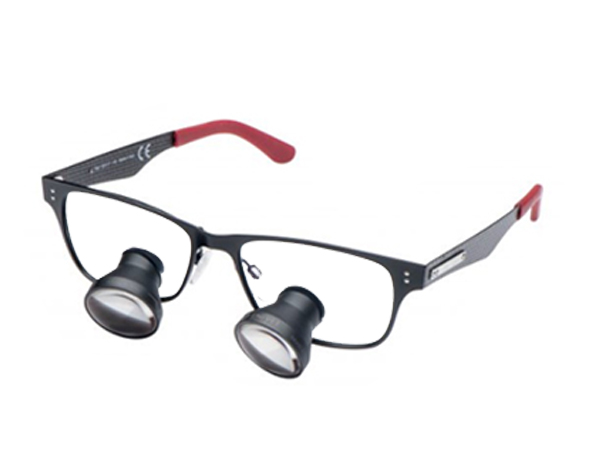
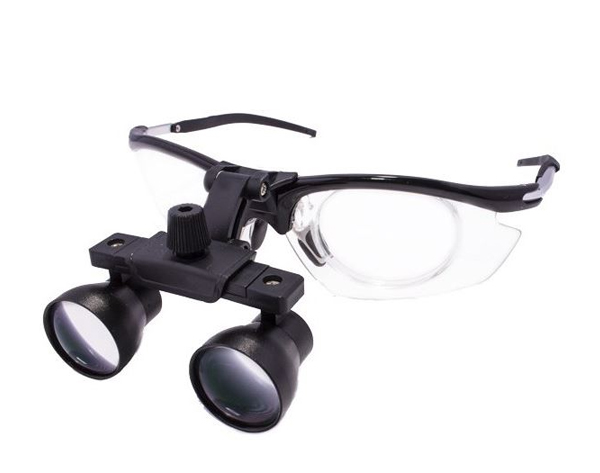
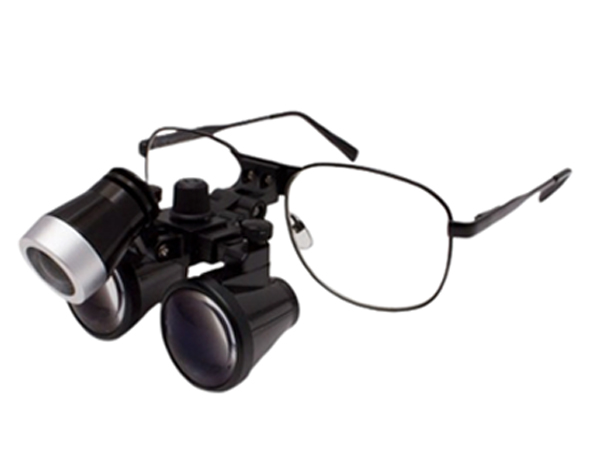
- Head-mounted magnifying glass: These are adjustable in diameter, visor type, with interchangeable lenses, lightweight and practical.
- Binocular loupes with mount: The loupes that are embedded in the glass lenses, on the other hand, have to be custom-made according to the user's vision parameters and are therefore more expensive, these have the advantage of being lighter in weight.
- Adaptable dental loupes: There are dental loupes that can be used with or without glasses, they can also be clip-on with or without frames, they have the advantage of being cheaper and adaptable by the user to their anatomy.
- Lighted dental loupe: Lighted dental loupes with a built-in LED light or other types of light are really useful when the dentist wants to illuminate the visual field of work, especially in places of great depth or reduced spaces. It is important to know not only the quality, but also the time of use without recharging.
The type of magnification also plays an important role. To cover the main magnification needs such as in general dentistry or implantology the magnifications should be between 2.5X and 3.5X, however for endodontics, periodontics, surgery or laboratory work higher magnification is required, the recommended magnifications are between 3.5X and 5.5X.
What to consider when choosing your dental loupes?
The quality of the lenses:
The best method of assessing this quality is to look at an object with straight black lines. The most common sign of poor quality lenses is a low resolution of the object rather than observing completely straight, clear lines.
Working distance:
This is the distance from the dentist's eyes to the patient's mouth. It is necessary to adopt a posture that not only allows working with ease but also avoids pain. The working distance depends on the height of the specialist and the way he/she works.
If you are less than 1.70 m tall:
- Sitting distance: 34 cm.
- Standing distance: 42 cm.
If you are between 1.70m to 1.90m:
- Sitting distance: 42 cm:
- Standing distance: 50 cm.
If you are taller than 1.90 m:
- Sitting distance: 50 cm.
- Standing distance: 55 cm.
Field of vision:
The field of vision is the area of operation seen through the loupes. Healthcare professionals appreciate a wider field of view because it is easier and faster to adjust and treat a patient, it also promotes less eye fatigue. The field width is related to the diameter of the loupe, the optical design and the magnification power.
Light transmission:
Optimised light transmission means working with less light, reducing eyestrain and minimising bright light exposure on the patient.
Depth of field:
The depth of field is the range of focus delivered by the loupe. This determines how much the magnifier can be tilted or moved while still maintaining the focus of the entire field of view. The depth of field depends on the illumination, optical design, magnification power, visual fatigue and the ability of the eye to focus with less effort.
Amplification or magnification:
The magnification of an optic is the ratio of the size of the image to the size of the object. It is a function of the characteristic of the optics and the distance to the object. But why is magnification important? The answer is very simple, magnification helps us to: Identify pathologies better, work more comfortably, see more detail and thereby reduce eye fatigue.
Maintenance of binocular loupes
In addition to all the points mentioned above, you should think about the material of manufacture, a material that does not deteriorate with water, as it is not only important to know how to choose your loupes, but also to have a good maintenance of these for their full operation. For this reason we recommend:
- Use a soft disposable wipe or paper towel with water or 70% alcohol.
- Clean thoroughly, the frame, holder, binoculars and all other parts.
- For the lenses, use a cotton or chamois cloth and use a lens cleaner to gently clean the lenses.
- Remember not to immerse in water, or any other liquid or abrasive product.
- Use protective screens, giving you an improved protection from splashes.
- Repeat the procedure after each patient.
Experts recommend that to begin using this instrument it is important to start with low magnification loupes 2.5X and then advance to generate an adaptation process, as these can cause dizziness or disorientation of the field of vision if you are not used to them.
Bearing in mind all the features and benefits of having binocular loupes in your hands, dare yourself to gain in health and take a look at our Dental magnifying glasses section on the web.





